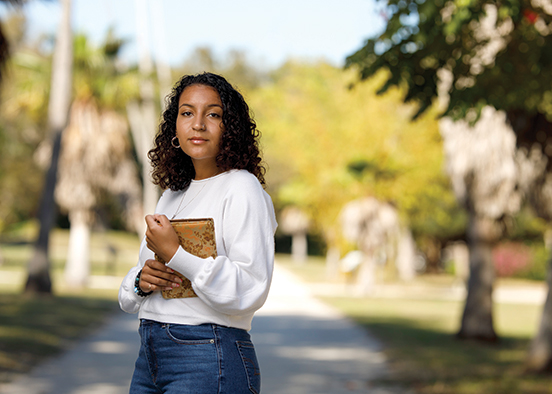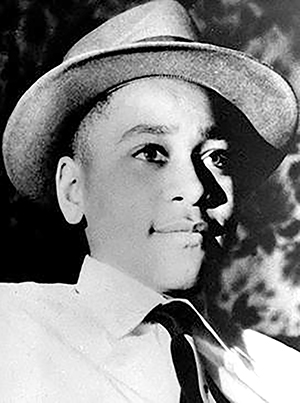
“When I sit down to write, I definitely have something to say,” Radovanic says. “Whether it’s my poems on Black Lives Matter, on my childhood trauma, even love poems – every single one of those has some sort of message.”
Sometimes Radovanic’s message is about her own experiences. She wants readers to understand what life was like for her, the child of two young teenagers, the oldest of seven siblings, raised by her grandmother. “Traumatic” is the word she uses to describe it.
Other times, her message is about important moments in history, moments that are too easily forgotten. While at FGCU, she wrote a poem about Emmett Till, a young Black man murdered in Mississippi in 1955. Till was just 14 at the time. His murderers accused him of whistling at a white woman in a grocery store. Till was so badly brutalized that his face was unrecognizable. His body was identified by the silver ring he wore.

Radovanic learned about Till in her high school honors English class. Her teacher spent an entire week on Till, and the details of his murder continued to haunt her after she graduated. In her creative writing class with Jesse Millner, an FGCU instructor of poetry, Radovanic wrote a poem with Till at its center. Only later, when she was searching for the name of Till’s mother, did she realize that she had written her poem on the day of Till’s death.
“I think it’s vital to write difficult poems like this one because they make us uncomfortable,” Radovanic says. “We have to get comfortable being uncomfortable. If no one steps out of their comfort zone and speaks up, we will continue to live in a world of ignorance.”
For Radovanic, the most essential ingredient in a poem is truth. All of her poetry comes from her own truth, she says. When she revises her poems, she goes back over the lines and asks herself, “Could I have been a little more honest?” She believes this kind of raw honesty is what matters in poetry. “I think you need to sit down and make a promise to yourself that what you’re about to write is vulnerable,” she says. “You have to promise not to hold anything back.”
Millner has seen Radovanic’s not-holding-back first-hand. “I would be constantly astounded by what she did,” he says. “When you read Niesha’s poems, you’re reading the truth. It doesn’t have to be the literal truth, though sometimes it is.”
The Emmett Till poem, in particular, impressed Millner. “The truth of what happened in America in the middle part of the 20th century – the shattering truth about racism – comes out of that poem. It shows the depth Niesha has in terms of her knowledge of the world.”
Radovanic is a psychology major with a minor in creative writing. After she graduates, she plans to attend graduate school and pursue a doctoral degree in psychology. Ultimately, she aims to go into clinical counseling. For now, she’s bringing the weight of her personal experience to her poetry. One example: When Radovanic first arrived in Southwest Florida from Clearwater, she was struck by the lack of diversity.
“I was incredibly self-conscious of my skin color,” she says, “of my hair being too curly, of what I wore. That came from being uncomfortable in my own body.” She channeled those feelings into her writing and tapped into her vulnerability. What emerged was a profoundly honest collection of poetry about what it’s like to be a Black woman in America today.
This, for Radovanic, is the ultimate purpose of her work – to be a catalyst for conversation and deeper understanding. As her poems reach the university campus and the Southwest Florida community, Radovanic is satisfied with what her work is accomplishing. “It’s doing the job I always wanted it to do.”[/vc_column_text][vc_column_text]
‘Let the Angels Sing’
By Niesha Radovanic
Because it smelled of ivory in Money, Mississippi,
Because he and the boys were plucking pieces of cotton,
Because the scorching sun slipped sweat down their backs,
Because the meat market was hungry for a new taste of color,
Because a Black boy blew bubbles of sugar,
Because the clickety-clack of the cash register made the clerk snap, her husband had to crackle POP.
Because the meat market men know how to slaughter locks,
Because countin’ sheep turn you into dead meat,
Because a .22 turned the boy’s hue,
Because lead piercing through his head was not enough to teach little boys to hush.
Because the cotton gin separated flesh with barbed wire as a necklace,
Because the little boy still wore his daddy’s ring, Uncle Wright told his sister to let the angels sing.
Because the Black boy birthed a whistle his lips turned blue.
– For Emmett Till
[/vc_column_text]